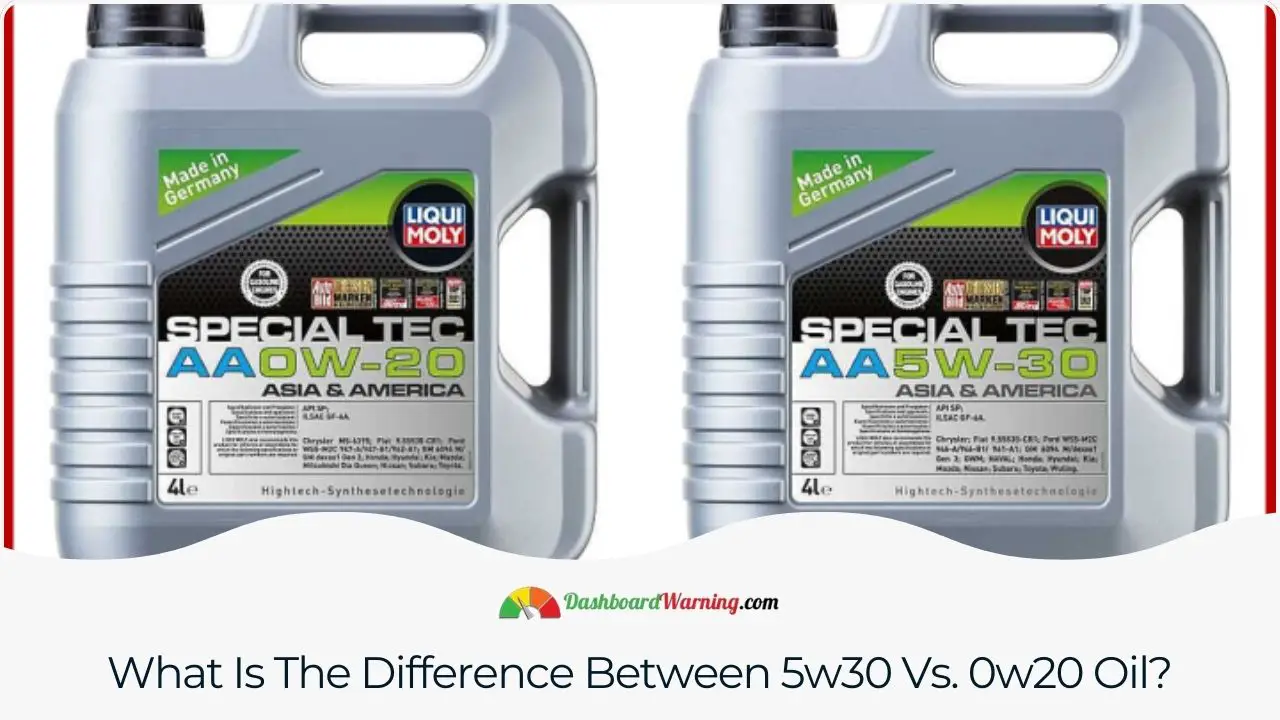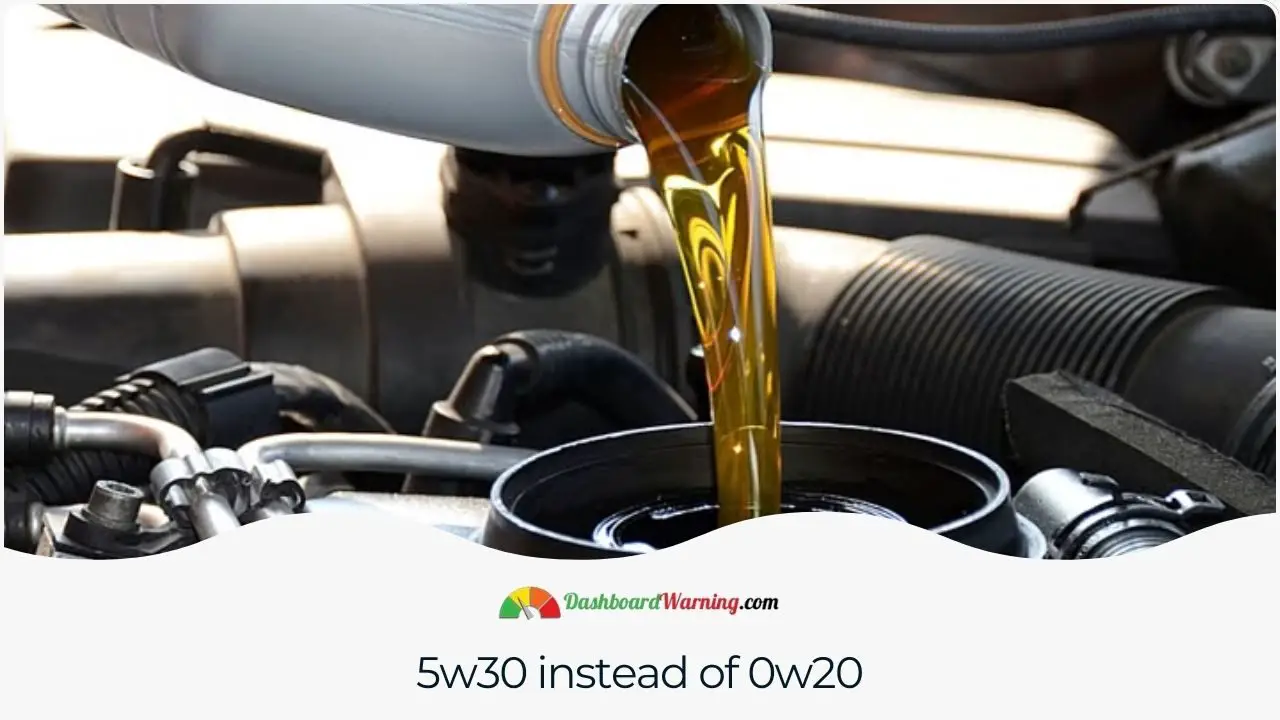The 5w30 and 0w20 are widely recognized for their excellent performance as multi-grade engine oils.
However, 5w30 is more readily available in local stores and can sometimes outperform 0w20 in specific situations.
This detailed article will explore whether you can use 5w30 instead of 0w20 in your vehicle engine and outline the main differences between these oils.
📢Read also: Can I Use 5w20 Instead Of 5w30?
What Happens If 5w30 is Used Instead Of 0w20?
5w30 can be used instead of 0w20. The difference is insignificant, but in extremely cold weather, you might notice a drop in performance with 5w30.
However, it depends on your engine's Variable Valve Timing (VVT). If your car has VVT, it's best to stick with the manufacturer's recommended oil weight.
Most newer engines have VVT and require thinner Oil for optimal performance. Thinner Oil works better with the VVT mechanism than thicker Oil.
If you own a relatively new vehicle, you should use 0w20. Specifically, for 2010 or newer models with fewer than 40,000 miles, it's advisable to avoid using 5w30.
Note: Since 0w20 is synthetic, use 5w30 Synthetic Oil to prevent any issues.
Using 5w30 instead of 0w20 generally won't cause major issues, but it depends on your vehicle and location. Here are a few key points to consider.
Climate:
The effectiveness of the Oil varies with temperature. In hot climates, 5w30 might perform better. You may notice a slight performance drop with 5w30 compared to 0w20 in cold climates.
Fuel Economy:
0w20 is known for its fuel efficiency. Switching to 5w30 may lead to a slight increase in fuel consumption.
Warranty:
Check your owner's manual for viscosity recommendations. If 5w30 is not approved by the manufacturer, using it could void your warranty.
Can 5w30 be mixed with 0w20?
Yes, 5w30 can be mixed with 0w20, but it is preferred to use 5w30 synthetic Oil instead of normal Oil.
Since 0w20 is either fully synthetic or part synthetic, using non-synthetic Oil could impact your car warranty.
What Is The Difference Between 5w30 Vs. 0w20 Oil?

Viscosity and Air Preference:
Viscosity measures how easily oil flows. The first number before "W" (W = Winter) indicates how the Oil flows when the engine starts. A smaller number means thinner Oil. Thus, 0w20 flows more easily and performs better in colder temperatures than 5w30.
The second number indicates the Oil's viscosity at operating temperatures. Higher numbers mean thicker Oil, so 5w30 is better suited for hot conditions. With a viscosity range 1.7 times wider than 0w20, 5w30 suits American and European climates.
0w20 excels in cold climates, while 5w30 is more reliable in warmer weather. Additionally, 5w30 is popular for its versatility, performing well in cold and hot temperatures.
Fuel Saving:
0w20, less dense than 5w30, offers about 10-12% better efficiency. This means it doesn't impact the fuel economy negatively. However, 0w20 is more expensive than 5w30, so European companies rarely recommend 0w20 oils.
Moreover, finding 5w30 is easier since it's more commonly available in regular lubrication stores than 0w20.
5w30 Vs. 0w20 Comparison:
| Characteristics | 0w20 | 5w30 |
| Oil Type | Multi-Grade | Muti-Grade |
| viscosity | 8.8 mm2/s | 9.5 mm2/s |
| Viscosity Index | 173 | 154 |
| Maximum Operating Temperature (°C) | +20 | +25 |
| Minimum Operating Temperature (°C) | -15 | -35 |
| Pour point (°C) | -48 | -44 |
| Flash Point (°C) | 206 | 185 |
| Preferable climate | It is more preferred for cold weather. | It is more preferred for hot weather. |
| Thickness | Thinnest | Thin |
| Performance | Copes with engine stress (deposits, wear, and heat), and provide engine protection. | It provides better protection against friction thanks to its thicker anti-wear feature. |
| Suitable Vehicle | Gasoline and Hybrid engine, Compact car or Subcompact | SUVs, trucks, small vans, and selected cars |
| Fuel Economy | Top in the market but costlier | Excellent |
Final Words
Regularly changing engine oil is crucial for optimal driving performance. Most manufacturers recommend multi-grade oils to ensure outstanding engine performance.
The most popular options are 0w20 and 5w30, both known for superior performance. Users often consider switching from 0w20 to 5w30 for various reasons.
However, many are concerned about potential issues. If you're wondering about this, I hope the above guide has provided you with answers and a helpful comparison.
Was this page helpful?


More important content about Tips and Advice
Porsche Cayenne Years To Avoid
Subaru Legacy Years To Avoid - 5 Worst Years
Pt Cruiser Years To Avoid
Tractor Dashboard Symbols And Meanings
Suzuki Sx4 Years To Avoid - 5 Worst Years
Tips and Advice
Subaru Legacy Years To Avoid - 5 Worst Years
Pt Cruiser Years To Avoid
Use 5w30 instead of 0w20 - Advantages and Disadvantages
Tractor Dashboard Symbols And Meanings
Suzuki Sx4 Years To Avoid - 5 Worst Years
Cummins ISX Years To Avoid and Why